In the rapidly evolving world of cryptocurrency, choosing the right type of wallet is more important than ever.
With hacks, scams, and privacy concerns lurking around every corner, making the wrong choice could cost you more than just money.
So, if you're confused between custodial vs non-custodial wallets and wondering which one is right, you're already a step ahead.
You see, the thing is, not all crypto wallets are created equal. Some prioritize control, while others offer convenience.
But which one should you trust with your digital assets? That's exactly what we're here to unpack.
Custodial vs Non-Custodial Wallet Market Stats
To truly grasp the custodial vs non-custodial wallet landscape, it helps to look at the numbers first.
-
- The global crypto wallet market is expected to hit $48.27 billion by 2030, growing at a CAGR of 24.8%.
- As of 2024, over 70% of new crypto users opt for custodial wallets due to their ease of use.
- However, non-custodial wallets have seen a surge in popularity among seasoned users, especially after high-profile exchange hacks.
- A report from Chainalysis found that nearly 60% of DeFi users rely on non-custodial wallets.
Clearly, the demand for both wallet types is booming, each catering to different user needs.
What is a Custodial Wallet?
Before we jump into the custodial versus non-custodial wallet comparison, let's break down the fundamentals of how crypto wallets actually work.
A custodial wallet is a type of crypto wallet where a third party - usually a crypto exchange or service provider -holds and manages your private keys. In simple terms, they "babysit" your wallet. Some of the famous custodial wallets are Binance, Coinbase, and Kraken.
► How Custodial Wallets Work
-
- When you use a custodial wallet, you're trusting a third party (like an exchange) to manage your crypto.
- You simply log in to your account to access and manage your digital assets.
- The wallet provider takes care of security, backups, and account recovery for you.
- Think of it like storing your valuables in a bank vault-safe, but not entirely under your control.
► Key Features of Custodial Wallets
-
- Easy access with login credentials
- Password recovery and customer support
- Regulated and compliant in many regions
- Multi-asset support
- Integrated trading platforms
So, who is this for? Generally, custodial wallets are great for beginners or those who prioritize convenience over control.
Alright, so that's the lowdown on custodial wallet meaning. Let's take a look at popular examples of custodial wallets.
Examples of Popular Custodial Wallets
Here are some well-known custodial wallets in the crypto space:
-
- Coinbase Wallet: A widely recognized name in crypto, Coinbase Wallet is known for its user-friendly interface, strong regulatory compliance, and seamless integration with the Coinbase exchange. It's a top choice for beginners who want a secure and easy-to-use custodial wallet.
- Binance Custodial Wallet: Managed by one of the world's largest exchanges, Binance's custodial wallet offers robust security features, access to a wide range of assets, and smooth integration with trading tools. It's ideal for users who value performance and ecosystem diversity.
- Kraken Wallet: Kraken provides a custodial wallet service that focuses heavily on compliance and institutional-grade security. With features like cold storage and 24/7 customer support, it's a solid option for users who prioritize both control and service.
- Crypto.com Wallet: This wallet is part of the broader Crypto.com ecosystem, offering integrated financial services, Visa card perks, and staking options. As a custodial wallet, it appeals to users who want convenience, benefits, and centralized features all in one place.
- BitGo: BitGo is a leading choice for institutional investors, providing multi-signature wallets, insurance coverage, and advanced security protocols. It's one of the most secure custodial wallet solutions for large-scale asset management.
- Gemini Wallet: Operated by the regulated Gemini exchange, this custodial wallet is known for its commitment to compliance and user protection. It's ideal for U.S. users seeking a legally compliant, secure, and easy-to-navigate wallet.
- Blockchain.com (Custodial Mode): While Blockchain.com offers both wallet types, its custodial mode is preferred by users who want backup and recovery options with added customer support. It's a trusted name for users transitioning into crypto.
These platforms are popular for their user-friendly interfaces and strong security protocols, making them ideal for mainstream adoption.
Now that we've seen what custodial wallets bring to the table, let's flip the coin. But what are your options if you want full control over your crypto? Let's talk non-custodial wallets.
What is a Non-Custodial Wallet?
So, what is a non-custodial wallet? A non-custodial wallet is the kind where you are in complete control of your private keys, and by extension, your crypto. No third party. No middleman. Just you and your wallet.
1. How Non-Custodial Wallets Work
-
- You install the wallet and secure your seed phrase, and just like that, you're in full control.
- Once the wallet is set up and your seed phrase is saved, you're officially the boss of your crypto.
- Get your wallet up and running, store the seed phrase safely, and you're the only one holding the keys.
2. Key Features of Non-Custodial Wallets
-
- Complete control over private keys
- No third-party access
- Ideal for DeFi and Web3 interactions
- Enhanced privacy and autonomy
- Non-recoverable if keys are lost
Still wondering, how does a non-custodial wallet work? It's basically like carrying your own vault everywhere, with no reset button.
That sounds empowering, right? But it’s not without its challenges. Let’s compare the differences between a custodial and non-custodial wallet.
Examples of Popular Non-Custodial Wallets
Here are some of the most trusted and widely used non-custodial wallets that give users full control over their crypto assets.
1. MetaMask
MetaMask is one of the most popular non-custodial wallets, especially for Ethereum and Web3 enthusiasts. Users maintain full control of their private keys and can interact directly with DeFi platforms and dApps.
It’s ideal for anyone who values privacy and autonomy. If you're asking, how does a non-custodial wallet work?-MetaMask is the perfect hands-on example.
2. Trust Wallet
Owned by Binance but completely non-custodial, Trust Wallet gives users total ownership of their assets and private keys.
It's widely used due to its mobile-first experience, multi-asset support, and integration with DEXs. For crypto beginners exploring types of crypto wallets, Trust Wallet is a flexible starting point- just don’t forget your seed phrase!
3. Exodus Wallet
Exodus combines sleek design with non-custodial power, letting users manage over 200 cryptocurrencies while keeping full control of their private keys. It’s ideal for those who want a beginner-friendly yet secure wallet.
As far as crypto wallet comparison goes, Exodus stands out for balancing simplicity and freedom.
4. Ledger Nano (Hardware Wallet)
Ledger Nano is a hardware-based non-custodial wallet known for unmatched security. Private keys never leave the device, protecting against hacks.
If you're serious about crypto and want to know which wallet is best for crypto beginners, but with a security-first mindset, Ledger might be your match.
5. Phantom Wallet
Popular among Solana users, Phantom is a lightweight, browser-based non-custodial wallet designed for speed and simplicity.
Users manage their own keys and interact directly with NFTs and DeFi apps. It’s gaining attention for its intuitive design and commitment to decentralization.
6. Trezor Wallet
Trezor is another hardware-based non-custodial wallet that emphasizes security and user control. Great for long-term holders and investors, it supports a wide range of digital assets and keeps everything offline.
Trezor is often recommended when discussing the difference between custodial vs non-custodial wallets from a security standpoint.
7. Edge Wallet
Edge is a mobile-first non-custodial wallet that focuses on privacy and ease of use. With no personal information required, it’s a go-to choice for those who value anonymity.
For anyone researching what are the benefits of a non-custodial wallet, Edge is a perfect blend of privacy, security, and performance.
Custodial vs non-Custodial Wallet: Key Difference
The core of the crypto wallet comparison boils down to control, security, and usability.
Whether you're a newbie investor or a DeFi pro, knowing the difference between custodial vs non-custodial wallet options is essential.
In this battle, it all comes down to a trade-off: convenience versus control.
Custodial wallets offer ease of use and recovery options, while non-custodial wallets put full ownership and responsibility in your hands.
Here’s a custodial vs non-custodial comparison:
|
Aspect |
Custodial Wallet |
Non-Custodial Wallet |
|
Ownership of Private Keys |
Held by third-party service (e.g., exchange or wallet provider) |
Held solely by the user |
|
Control Over Funds |
Partial control – depends on provider policies |
Full control – user manages everything |
|
Ease of Use |
Very user-friendly, especially for beginners |
Requires basic crypto knowledge and responsibility |
|
Backup & Recovery |
Easy recovery via email/2FA or provider support |
User is responsible for backing up the seed phrase; no support if lost |
|
Security Responsibility |
Managed by the provider (with risks if the platform is hacked) |
Entirely managed by the user |
|
Privacy |
Lower – KYC/AML compliance is often required |
Higher – typically no KYC, more anonymous |
|
Speed of Access |
Usually faster for transactions and login |
May involve extra steps for signing and confirming transactions |
|
Use Case |
Ideal for quick trades, centralized exchange activity |
Perfect for DeFi, staking, and Web3 interactions |
|
Compliance & Regulation |
Regulated and compliant with legal frameworks |
Mostly unregulated; users are responsible for their own legal understanding |
|
Customer Support |
Available – support teams help with issues and recovery |
None – self-custody means no support |
|
Examples |
Coinbase, Binance, Gemini, Crypto.com |
MetaMask, Trust Wallet, Exodus, Ledger, Phantom |
|
Monetization Opportunities |
Providers can monetize through transaction fees, custodial services |
Wallet creators can monetize via DeFi tools, swaps, and premium features |
|
Target User Group |
Beginners, casual investors |
Advanced users, DeFi enthusiasts, and privacy-focused individuals |
One of the questions that often pops up is whether a custodial wallet is safer than a non-custodial one. It depends on your needs.
If you’re just starting out, you might ask, Which wallet is best for crypto beginners?- and the answer could be custodial. But if freedom and privacy are your priorities, non-custodial might be the way.
The best way to end the custodial vs non-custodial wallet difference is to take a look at their pros and cons. This is what we are going to see in the next section:
Pros and Cons of Custodial Wallet
A common question people ask when choosing between custodial versus non-custodial wallets: What are the pros and cons of a custodial wallet? And honestly, that's the perfect place to start.
1. Advantages of Custodial Wallets
Here are some key advantages of custodial wallets:
1.1 User-Friendly Access
Let’s be real- when you’re just getting started with crypto, the last thing you want is to deal with private keys, seed phrases, or complex setups.
With a custodial wallet, all you need is a username and password to log in and start managing your assets. It feels a lot like using online banking: familiar, straightforward, and designed to be beginner-friendly.
You don’t have to be a blockchain wizard to use it, which is why custodial wallets are often the go-to for first-time users.
1.2 Backup & Recovery Made Easy
One of the biggest fears in the crypto world? Losing your wallet and never being able to get it back.
But with a custodial wallet, that stress is gone - this is one of the clearest advantages in the custodial wallet vs non-custodial wallet comparison.
If you lose access to your account, the provider typically has recovery options in place, whether it’s email verification, two-factor authentication, or even a full support team that can guide you through the process.
Compare that with a non-custodial wallet, where losing your seed phrase means game over. Not exactly ideal if you're the forgetful type.
1.3 Dedicated Customer Support
We’ve all hit tech roadblocks, right? Whether it’s a login issue, a stuck transaction, or just confusion about fees, having customer support makes a huge difference.
With most custodial wallets, you can reach out via chat, email, or even phone in some cases. Try getting that kind of help from a non-custodial wallet.
Spoiler alert: you won’t. In self-custody, you are the customer support.
1.4 Compliance & Regulation
Worried about legalities or potential government scrutiny? Most reputable custodial wallet providers are fully licensed, KYC-compliant, and follow strict anti-money laundering regulations.
This adds an extra layer of legitimacy and trust, especially for businesses or institutions entering the crypto space.
Suppose you're running an exchange, planning to integrate a wallet as a service, or offering crypto to mainstream users. In that case, compliance can be a deal-breaker, and custodial wallets tick that box.
1.5 All-in-One Ecosystem & Integration
This is where custodial wallets really shine.
Many of them are tightly integrated with exchanges, trading platforms, staking programs, and even credit/debit card features.
Want to buy, sell, stake, or swap tokens without leaving your wallet? Easy. Some even offer savings-like features with interest payouts.
And with tech like AI in wallets becoming more popular, these ecosystems are getting smarter, offering spending insights, fraud alerts, and personalized asset recommendations right inside the wallet.
1.6 Ideal for Mass Adoption
Because of all these features- ease of use, support, safety, custodial wallets are often seen as the gateway to crypto for mainstream users.
They're less intimidating, more convenient, and frankly, just more accessible for the average person who wants in on the crypto revolution without diving into the deep end.
2. Disadvantages of Custodial Wallets
Here are some limitations of custodial wallets:
2.1 You Don’t Hold Your Keys
You’ve probably heard the saying, “Not your keys, not your coins.” Well, that hits the nail on the head when it comes to custodial wallets.
When you go custodial, you're essentially handing over control of your private keys to a third-party provider.
Sure, it makes life easier, but it also means your crypto isn’t truly yours in the way it is with a non-custodial wallet.
If the platform restricts access or goes down for maintenance, or worse, gets shut down-you’re stuck waiting and hoping.
2.2 Security Risks Exist
Here’s the thing: even though many custodial services have top-tier security systems, no one is 100% immune to hacks.
Centralized exchanges and custodial platforms have historically been prime targets for cyberattacks.
And when something goes wrong, users often have little recourse. You’re putting a lot of faith in someone else’s cybersecurity protocols, and if they mess up, your funds could vanish.
With a non-custodial wallet, at least you control the vault and what happens inside it.
2.3 Limited Privacy
Want to stay anonymous while trading or managing your crypto? That’s going to be tough with most custodial wallet providers.
They typically follow strict KYC (Know Your Customer) and AML (Anti-Money Laundering) rules, which means you’ll need to upload documents, verify your identity, and share your personal info.
While that’s great for compliance and safety in regulated environments, it’s not ideal for users who value privacy and decentralization.
2.4 Less Freedom to Explore DeFi & Web3
If you’re curious about decentralized finance, NFTs, or Web3 dApps, a custodial wallet might feel like you’re stuck in the lobby of a much bigger building.
Many custodial platforms don’t support deep DeFi interactions or dApp integrations, either because of security concerns or regulatory limitations.
On the other hand, non-custodial wallets are purpose-built for this kind of stuff. Want to stake, farm, or lend your crypto in DeFi protocols? You’ll hit fewer roadblocks with a self-custody setup.
2.5 Platform Dependency
Another risk? You're at the mercy of the wallet provider’s decisions.
If they change their policies, increase fees, geo-restrict certain features, or even go out of business, there’s not much you can do.
You’re relying on a centralized entity, which kind of goes against the very spirit of crypto, right?
So yeah, while custodial wallets definitely make crypto easier and more approachable, they do come with trade-offs. It’s not that they’re “bad”-they’re just not built for everyone.
Especially if you're the kind of user who values freedom, privacy, and control, the limitations of custodial wallets can feel like a dealbreaker.
Pros and Cons of Non-Custodial Wallet
When people first hear about non-custodial wallets, their immediate reaction is usually: “Wait… so I have to manage everything?” Yep, that’s the trade-off.
But with greater control comes greater freedom- and a little more responsibility, too. Let’s break down the good and the not-so-good sides of going non-custodial.
1. Advantages of Non-Custodial Wallets
Refer to the content below to find out about the advantages of a non-custodial wallet:
1.1 Total Control = Total Ownership
One of the biggest non-custodial wallet pros? You-and only you-hold the private keys. That means no one else has access to your funds.
Ever. You’re not relying on a provider or platform to safeguard your crypto. It’s just you and your wallet.
If you're someone who values sovereignty and independence in the digital world, this is a game-changer. Want to know what are some non-custodial wallet pros? This is right at the top of the list.
In the great discussion of custodial versus non-custodial wallets, non-custodial totally takes the crown when it comes to ownership.
1.2 Enhanced Privacy
Unlike custodial wallets that typically ask for your passport, selfie, and maybe even your favorite pizza topping (okay, not that far), non-custodial wallets generally don’t require personal info.
No KYC. No data trail.
That’s why they’re a go-to for privacy-focused users who want to stay anonymous while managing their assets.
1.3 Built for DeFi & Web3 Adventures
If you're planning to dive into decentralized finance, stake tokens, explore NFTs, or interact with dApps, non-custodial wallets are your golden ticket.
These wallets are basically the keys to the kingdom of DeFi. From MetaMask to WalletConnect, they're designed to support the ever-growing features of digital wallets that align with modern blockchain ecosystems.
1.4 Reduced Platform Dependency
No third-party middlemen, no dependency on centralized platforms. That’s a huge plus.
If an exchange freezes withdrawals or goes bankrupt (it’s happened), non-custodial users can chill.
Their funds are safe and accessible because they’re not stuck on someone else’s server.
This level of independence is why many consider it one of the top pros of non-custodial wallet setups.
1.5 Future-Ready and Tech-Forward
As we continue to see new trends in digital wallet development-like AI-driven fraud detection, multi-chain integrations, and even smart contract wallets-non-custodial models are leading the charge.
They’re agile, decentralized, and evolving fast to keep up with the shifting crypto landscape.
2. Disadvantages of Non-Custodial Wallets
Of course, it’s not all smooth sailing. With no centralized provider backing you up, you're flying solo. Lost your seed phrase? That’s on you.
These are some real hurdles that come with all that freedom. We have mentioned some more below:
2.1 You Lose Your Keys, You Lose Everything
Let’s be genuine, non-custodial wallets are awesome, but they're not very forgiving. If you forget or lose your seed phrase, there's no “Forgot Password?" button.
No help desk. No reset link. It's just… gone. That's a serious risk and one reason why some folks steer clear despite all the benefits.
2.2 Steep Learning Curve
If you’re new to crypto, setting up a non-custodial wallet might feel like trying to program a spaceship.
You need to understand phrases like “gas fees,” “sign transactions,” and “network compatibility.”
It’s not rocket science, but it’s definitely not plug-and-play either, especially when compared to a traditional custodial setup.
2.3 No Built-In Support System
Ran into an issue? Accidentally sent crypto to the wrong address? No one is going to help, and you’re on your own.
Non-custodial wallet users don’t have customer service teams to lean on. This lack of support can be stressful if something goes sideways, especially for casual or less tech-savvy users.
2.3 Higher Responsibility for Security
You're now the guardian of your own vault.
That means setting strong passwords, securing your recovery phrase offline, avoiding phishing scams, and maybe even learning about hardware wallets. While this level of responsibility is empowering, it can also be overwhelming.
2.4 Some Limitations on Fiat Integration
Need to convert crypto to fiat directly in your wallet? That’s not always an option with non-custodial wallets.
While integrations are improving thanks to the latest features of digital wallet tools, custodial platforms still have the upper hand when it comes to seamless fiat on/off ramps.
Choosing the Right Wallet: Custodial vs. Non-Custodial
So, which one’s better? Truth is, there’s no one-size-fits-all answer.
It all boils down to your comfort level, experience, and what you plan to do with your crypto.
Here’s a custodial vs non-custodial comparison that’ll help you make an informed choice based on your persona:
1] For Crypto Beginners: Prioritizing Simplicity and Support
If you’re just dipping your toes into crypto, custodial wallets are probably the way to go.
They’re super easy to use, come with customer support, and let you focus more on learning and less on tech stuff.
You don’t have to worry about seed phrases or managing private keys- your provider’s got your back.
2] For Intermediate Users: Balancing Independence and Functionality
Been around the block and want a little more control? Maybe you’ve started exploring DeFi or thinking about staking.
In that case, non-custodial wallets offer more freedom while still being manageable. You’ll need to take on some responsibility, but the payoff is better access to decentralized tools.
3] For Institutions and High-Volume Traders: Emphasizing Compliance and Security
Institutions and serious traders often prefer custodial wallets because of regulatory compliance, added insurance, and professional-grade security- key factors in the custodial vs non-custodial wallet difference.
Many custodial & non-custodial exchanges offer institutional-level solutions with features like cold storage, audit trails, and recovery protocols.
4] For Privacy-Focused Users: Maximum Control and Anonymity
Suppose you're big on privacy and don't want to hand over personal info. In that case, a non-custodial wallet is your best friend- a key distinction in the custodial wallet vs non-custodial wallet choice.
You’ll have complete control, no KYC requirements in many cases, and direct access to Web3 tools and DeFi protocols. Just remember- responsibility is 100% on you.
5] Hybrid Approach: Leveraging the Best of Both Wallet Types
Can’t decide between the two? No worries. You can use both! Many seasoned users manage multiple wallets depending on the use case.
For example, they might store a portion of their assets in a custodial wallet for easy trading and the rest in a non-custodial wallet for long-term storage and privacy.
For businesses looking to create a wallet app, understanding this custodial vs non-custodial comparison is crucial.
That way, you get the convenience of custodial services and the autonomy of self-custody. Best of both worlds, right?
JPLoft: Your Development Partner
In today's digital economy, deciding between custodial and non-custodial wallets is critical, whether you're a crypto beginner prioritizing ease of use or a DeFi enthusiast demanding full control.
Custodial wallets (like Coinbase) offer convenience but require trust in third parties, while non-custodial options (like MetaMask) put you in complete charge of your assets.
The right solution depends on your security needs, compliance requirements, and user experience goals.
For businesses looking to build secure, scalable wallet solutions, partnering with the best eWallet app development company like JPLoft is essential.
Whether you need a custodial exchange wallet or a non-custodial DeFi powerhouse, JPLoft's expertise ensures a future-ready product. Contact us today to build your next-gen wallet!
Conclusion
Choosing between custodial and non-custodial wallets depends on your priorities: convenience vs. control.
Custodial wallets (like Coinbase) simplify crypto for beginners, while non-custodial options (like MetaMask) empower DeFi users with full ownership.
Both have trade-offs—security risks with third parties vs. irreversible losses if keys are lost. As the crypto wallet market grows, hybrid solutions are emerging to balance ease and autonomy.
For businesses, partnering with a skilled wallet development team ensures scalability, compliance, and cutting-edge features. Whether you’re a startup or enterprise, the right wallet strategy can drive adoption and trust.
FAQs
Custodial wallets (e.g., Coinbase) hold your private keys, offering ease but less control. Non-custodial wallets (e.g., MetaMask) let you own keys, prioritizing security and autonomy.
Coinbase exchange is custodial, but Coinbase Wallet (separate app) is non-custodial. Users control private keys in the latter.
They're secure if the provider uses strong measures (cold storage, 2FA), but centralized platforms are hack targets. Not your keys, not your crypto.
Top picks: Binance (for trading), Gemini (compliance), Crypto.com (all-in-one perks). Choose based on fees and features.
MetaMask (DeFi), Ledger (hardware security), Trust Wallet (mobile-friendly). Prioritize open-source, audited options.





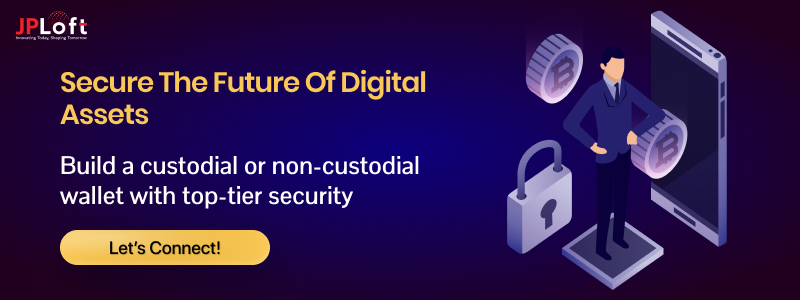
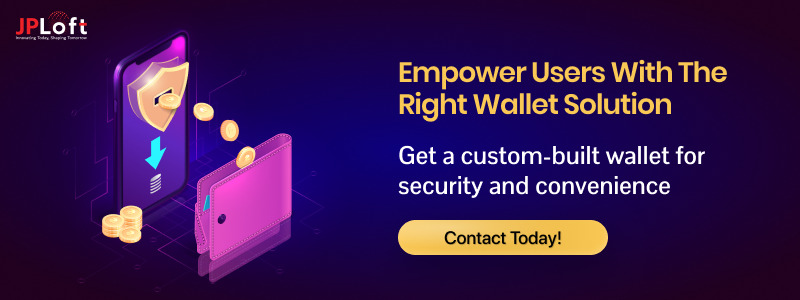

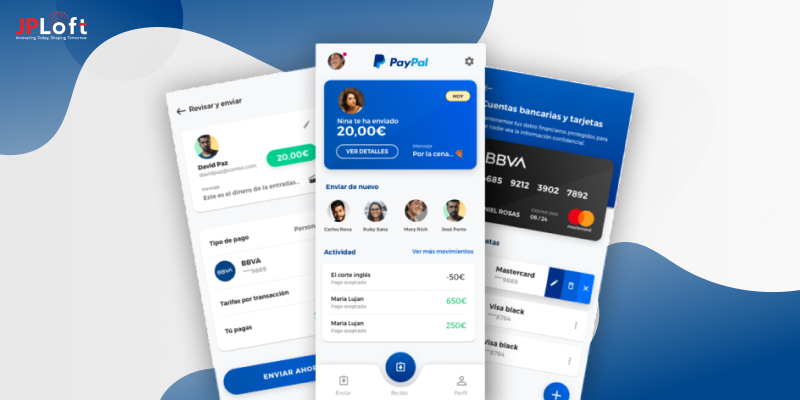
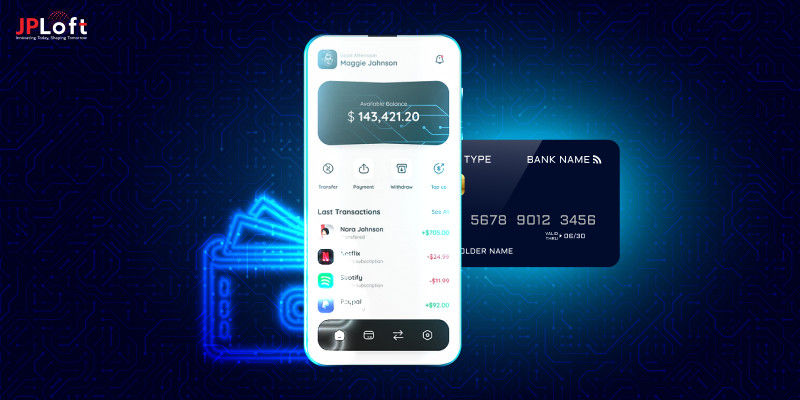
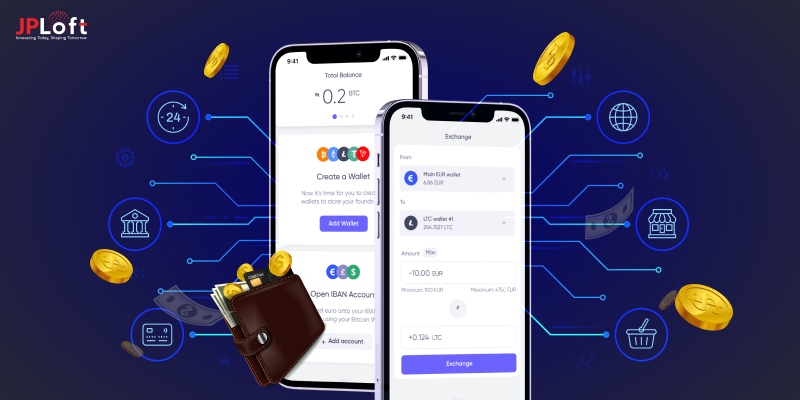



Share this blog